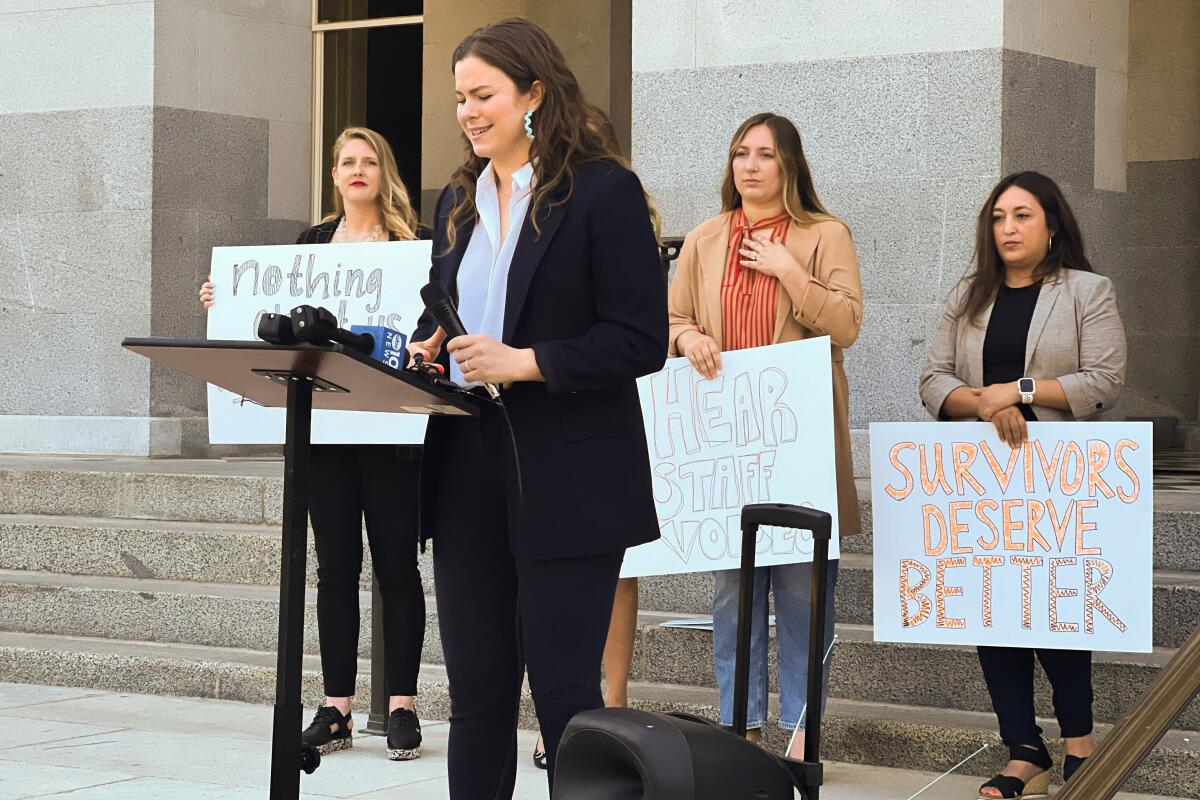California Politics: Changing the way harassment is investigated in the Capitol

- Share via
SACRAMENTO — After the #MeToo movement revealed a described culture of rampant workplace misconduct in the state Capitol, legislative leaders announced the creation of an independent panel of legal experts to handle employees’ complaints of discrimination and harassment.
The Workplace Conduct Unit’s policy pledges to protect staffers from discrimination, harassment and retaliation and its investigators are tasked with conducting “prompt, independent and objective investigations” into allegations of inappropriate workplace behavior.
In its first two years, the unit received 349 complaints and resolved 95% of them.
But a group of former Capitol employees and women’s advocates this year raised serious concerns with the unit, claiming that investigations often took too long and that communication during the process was lackluster.
Similar complaints were echoed in a sexual harassment and retaliation lawsuit filed last year by a former staffer against the state Senate that includes the Workplace Conduct Unit as a defendant. Current and previous employees who pushed for legislation this year that would have allowed them to start the unionization process also cited frustration with the panel.
The coalition called on top lawmakers this summer to increase oversight and transparency through a list of proposed changes and organized a pledge against harassment and discrimination in politics for candidates and elected officials to sign.
In August, Assembly Speaker Anthony Rendon (D-Lakewood) and Senate President Pro Tem Toni Atkins (D-San Diego) agreed to certain improvements in response to the criticisms.
“At its core, the goal of the WCU is to help foster a culture of respect, civility, and diversity in the Legislature,” the two leaders wrote.
A suite of changes
Rendon and Atkins promised more resources to clear a “backlog of cases,” which they said had already been eliminated, and established a new goal of finishing investigations within 60 days when possible.
They said the WCU also committed to providing monthly updates to complainants and respondents during investigations, “and more frequently depending on developments.”
Other improvements include a new “navigator” position within the WCU to assist those participating in an investigation, as well as additional mandatory training for members and staff.
Finally, Atkins and Rendon agreed to release additional data, including the “number of substantiated allegations, number of allegations for which discipline was imposed, number of terminations, and average investigation length by year.”
“The progress we’ve made thus far is a step in the right direction,” Atkins and Rendon wrote. “We will continue to review our work to ensure the WCU is an effective tool for creating a culture of respect, civility and diversity.”
Enjoying this newsletter? Consider subscribing to the Los Angeles Times
Your support helps us deliver the news that matters most. Become a subscriber.
Is it enough?
Ruth Ferguson, a former district staffer and a co-founder of the group Stop Sexual Harassment in Politics, said those commitments were welcome news. Ferguson wrote an op-ed in the San Francisco Chronicle this year alleging misconduct in her former office and an insufficient response by the Workplace Conduct Unit.
“We’re pleased with the reforms that they announced. And at the same time, there’s still a lot more work to be done,” she said.
Ferguson said a more explicit commitment to transparency and accountability is necessary, along with greater clarity on what the navigator’s role includes. Her organization has also requested a new survey for staff to share how comfortable they feel with reporting their workplace concerns.
She said it’s still “too early to tell” whether the changes will make it easier for people to come forward with allegations of misconduct in the Capitol.
“I want to believe that these changes will make the workplace safer. But the reality is that people make the workplace safer,” she said. “These policies are only as good as the people who uphold them.”
California politics lightning round
— Voters support Gov. Gavin Newsom’s mental health plan and back mandatory kindergarten, poll shows.
— Republican Brian Dahle is likable, level-headed and highly respected, columnist George Skelton writes. But he won’t win California governor.
— The only Democrat in the November contest for California controller is facing scrutiny over the recent suspension of a business license and the foreclosure of her San Francisco condo more than a decade ago.
— California voters will decide this November between an incumbent Democrat embroiled in controversy and his novice Republican challenger in the race for insurance commissioner.
— If online sports gambling companies, California tribes and card rooms thought Proposition 26 or 27 could win, they placed a bad bet. A new poll from the UC Berkeley Institute of Governmental Studies, co-sponsored by The Times, shows little chance voters will approve either sports betting measure.
Stay in touch
Did someone forward you this? Sign up here to get California Politics in your inbox.
Until next time, send your comments, suggestions and news tips to capolitics@latimes.com.
Sign up for Essential California
The most important California stories and recommendations in your inbox every morning.
You may occasionally receive promotional content from the Los Angeles Times.







